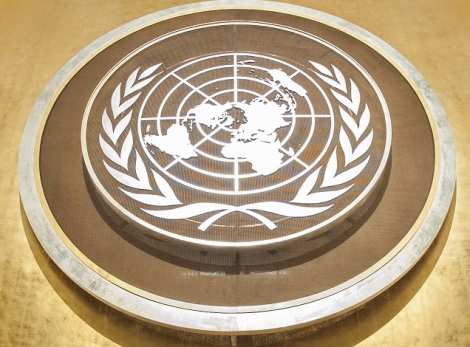The United Nations

The United Nations was created in 1945 with a membership of 51 countries. Its basis was the United Nations Charter, which was based on a series of concepts created by the UK, the USA, the Soviet Union and China, as the leading Allies fighting the Axis powers.
The purposes of the United Nations, according to the Charter, ‘are to maintain international peace and security; to develop friendly relations among nations; to cooperate in solving international economic, social, cultural and humanitarian problems and in promoting respect for human rights and fundamental freedoms; and to be a centre for harmonizing the actions of nations in attaining these ends’.
The forerunner of the United Nations was the League of Nations, an organisation also created out of war – the First World War – and established in 1919 under the Treaty of Versailles ‘to promote international cooperation and to achieve peace and security’. The League of Nations collapsed when it failed to prevent the Second World War. The new United Nations was intended to be much stronger.
The key structures of the UN are as follows:
The General Assembly is the main discussion body of the United Nations. It is composed of representatives of all member states, each of which has one vote. Decisions on important questions, such as those on peace and security, admission of new members and budgetary matters, require a two-thirds majority. Decisions on other questions are by simple majority. Some of its key functions are:
- To consider and make recommendations on the general principles of co-operation for maintaining international peace and security, including disarmament;
- To discuss any question relating to international peace and security and, except where a dispute or situation is currently being discussed by the Security Council, to make recommendations on it;
- To make recommendations for the peaceful settlement of any situation that might impair friendly relations among nations;
- To receive and consider reports from the Security Council and other United Nations organs;
- To elect the non-permanent members of the Security Council and the members of other United Nations councils and organs and, on the recommendation of the Security Council, to appoint the Secretary-General.
The Security Council has primary responsibility for the maintenance of international peace and security. It is organised so that it can function continuously, and a representative of each of its members must be present at all times at United Nations Headquarters.
It is made up of five permanent members – the UK, the USA, Russia, China and France – and ten non-permanent members, elected by the General Assembly for two-year terms and not eligible for immediate re-election.
The Council can issue ceasefire directives. It can also send United Nations peacekeeping forces to help reduce tensions in troubled areas, keep opposing forces apart and create conditions of calm in which peaceful settlements may be sought. The Council may decide on enforcement measures, economic sanctions (such as trade embargoes) or collective military action.
Each Council member has one vote. For general decisions about processes, nine out of the 15 votes are needed in favour, but for important decisions – such as intervention, serious sanctions, etc. – nine votes are needed, including from all of the five permanent members. This sometimes leads to the power of veto by one of the permanent members.
The International Court of Justice (ICJ) is the judicial body of the UN. It was established by the Charter of the United Nations and began work in April 1946.
The Court is at the Peace Palace in The Hague (Netherlands). Of the main bodies of the United Nations, it is the only one not located in New York (USA).
The Court’s role is to settle, in accordance with international law, legal disputes submitted to it by states and to give advisory opinions on legal questions referred to it by authorised United Nations bodies and specialised agencies.
The Court is composed of 15 judges, who are elected for terms of office of nine years by the United Nations General Assembly and the Security Council. It is assisted by a Registry, its administrative body. Its official languages are English and French.
The Secretariat is the administrative body of the UN. It is made up of international staff working in duty stations around the world, and it carries out the diverse day-to-day work of the organisation. It services the other principal bodies of the United Nations and administers the programmes and policies laid down by them. At its head is the Secretary-General, who is appointed by the General Assembly on the recommendation of the Security Council for a five- year, renewable term.
The Economic and Social Council (ECOSOC) is the body for co-ordinating the economic, social and related work of the 14 UN specialised agencies, ten functional commissions and five regional commissions. The Council also receives reports from UN funds and programmes. In carrying out its mandate, ECOSOC consults with academics, business sector representatives and more than 2,100 registered non-governmental organisations.
The Trusteeship Council was the body that looked after geographical areas or regions that were put under trust to the UN. The body was suspended on 1 November 1994, after the independence of Palau, the last remaining United Nations trust territory, on 1 October 1994.
Since 1945, the UN has acted as the main international body for discussion around international disputes, for co-ordinated actions and as a forum for acting to either prevent or intervene in conflicts and wars. All the member countries contribute financially to the UN. It now has 192 member countries, making it the most encompassing of all the international organisations.
The UN has been key in developing universal understandings and international ideals, such as the ‘United Nations Declaration of Human Rights 1948’, the ‘Convention on the Prevention and




